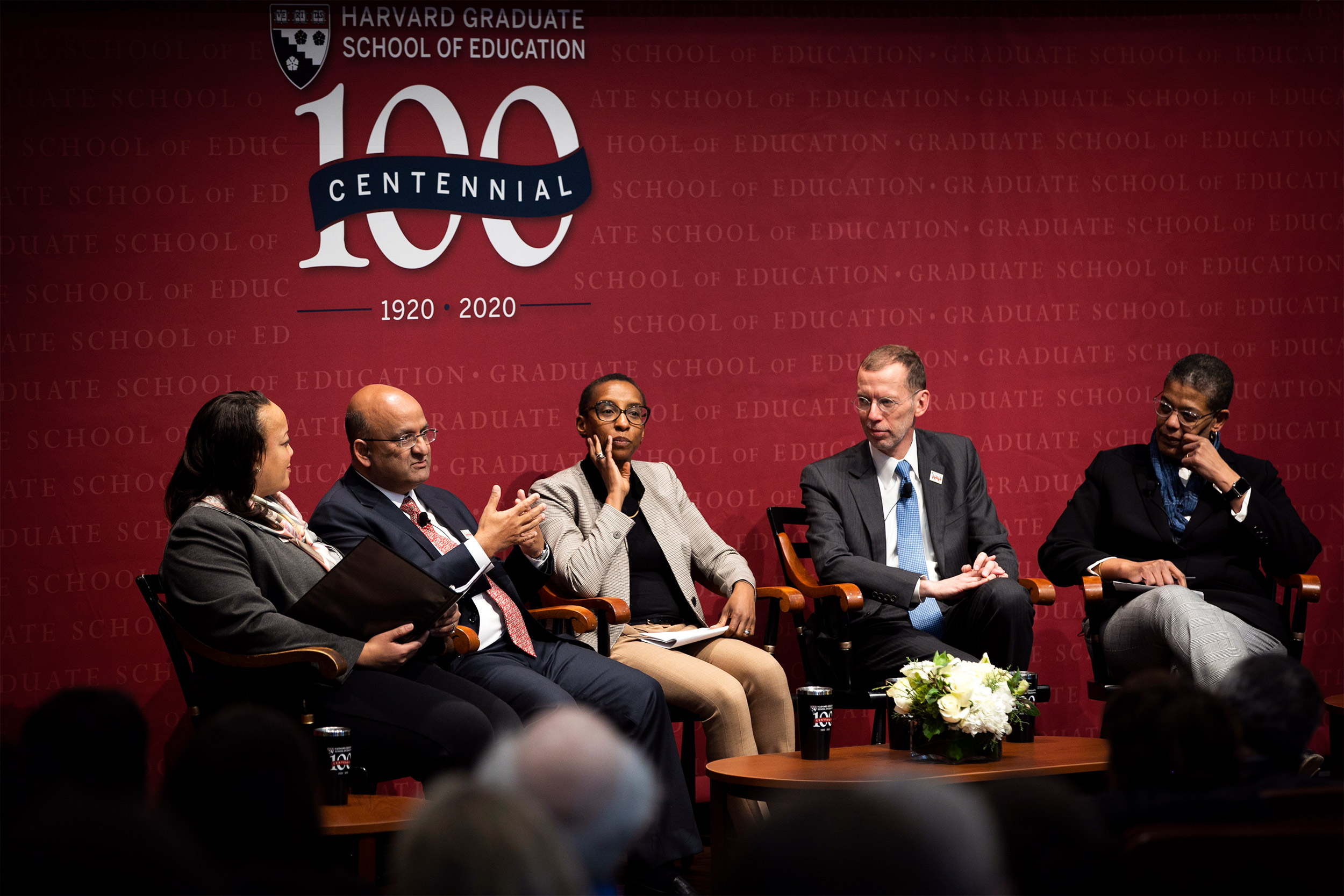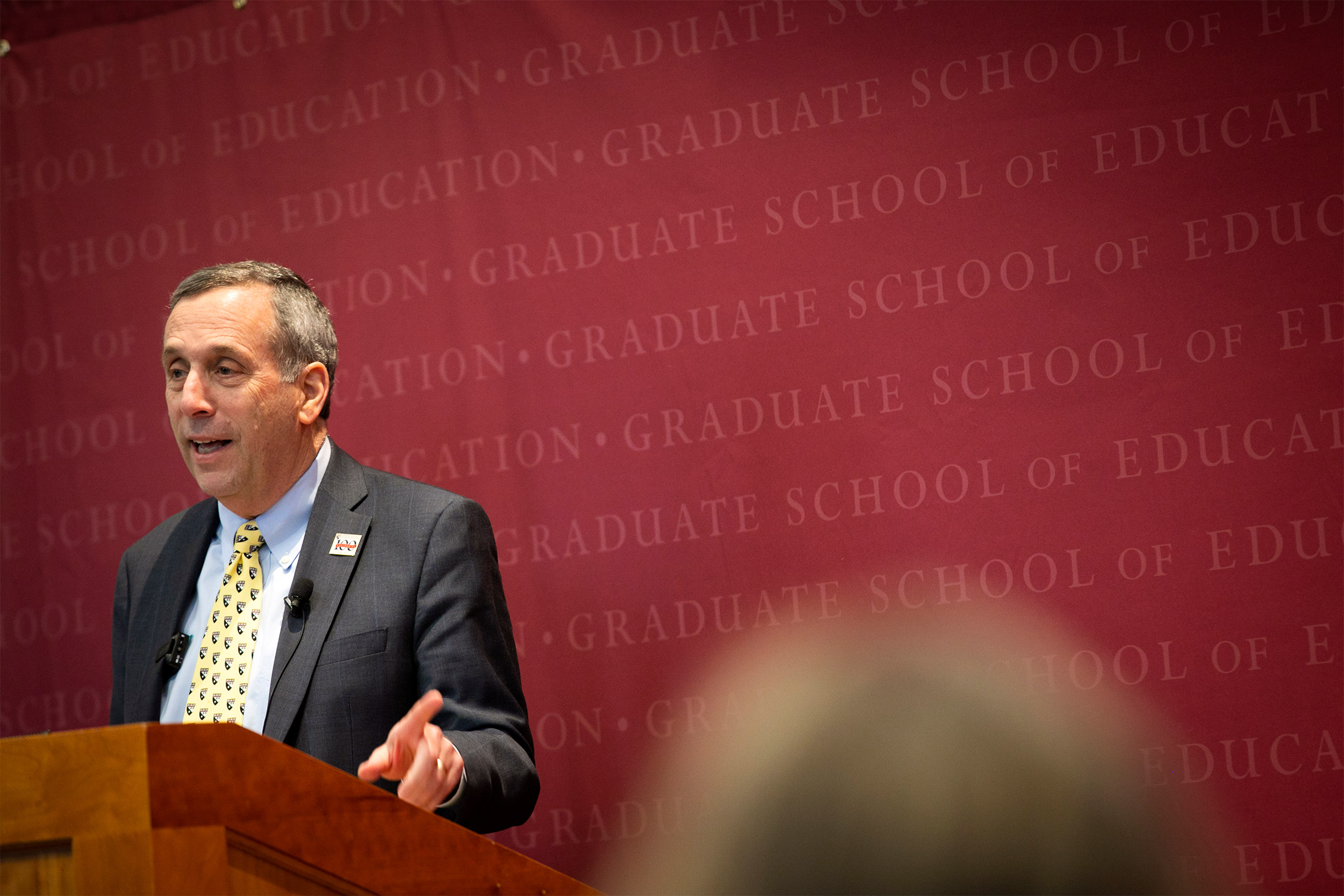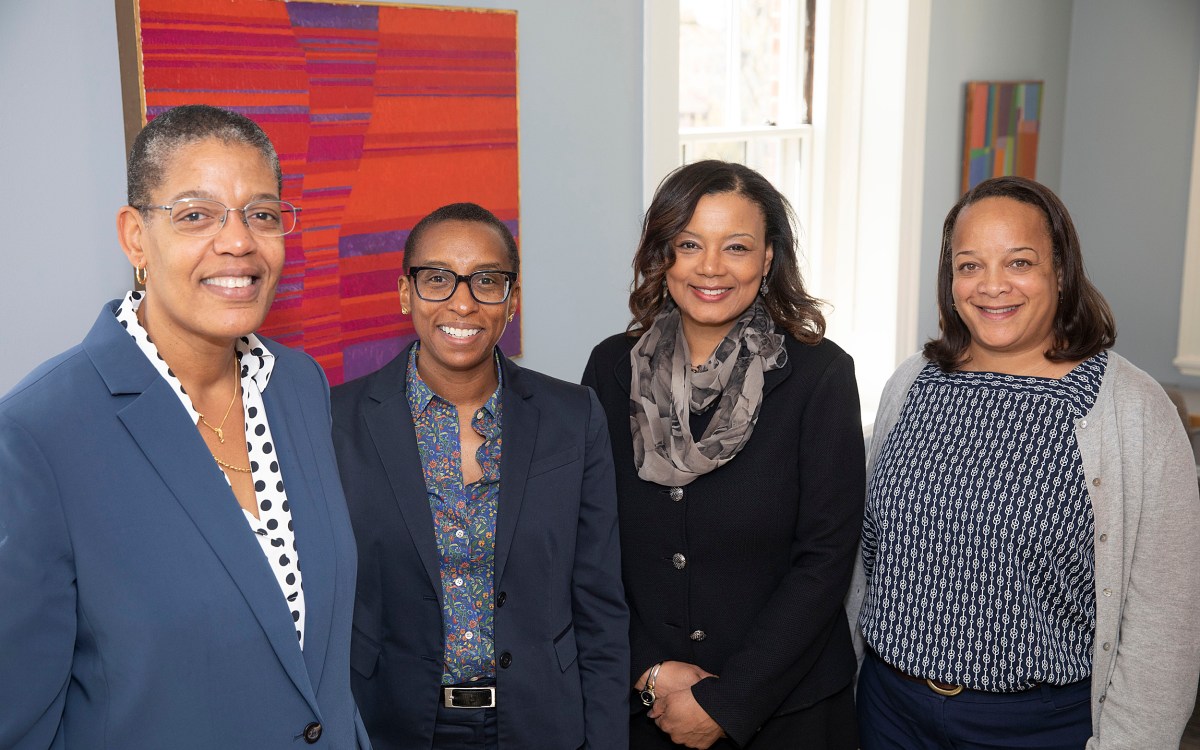
A panel discussion on “Why Education Matters” included HGSE Dean Bridget Terry Long (from left), Nitin Nohria, Claudine Gay, Douglas Elmendorf, and Michelle Williams.
Photos by Stephanie Mitchell/Harvard Staff Photographer
A century of making society better
Taking stock of the Graduate School of Education and looking ahead
Margot Stern Strom co-developed a curriculum on the Holocaust for elementary students that is now used in schools in more than 200 countries. Geoffrey Canada ran the Harlem Children’s Zone to tackle poverty and the achievement gap. Ruth Wong Hie-King served as director of the National Institute of Education in her native Singapore, helping transform the teaching profession in that country.
The stories of Strom, C.A.S. ’77, Canada, Ed.M.’75, and Wong, Ed.D. ’62, all graduates of the Harvard Graduate School of Education (HGSE), were highlighted Thursday afternoon by Bridget Terry Long, dean of the Ed School, as examples of the kind of impact alumni have had around the world.
Long, the Saris Professor of Education and Economics, spoke before a packed room at Askwith Hall at the panel of five Harvard deans called “Why Education Matters,” which kicked off the festivities to mark the School’s Centennial.
“These are stories of hope,” said Long in her opening remarks. “They are evidence that we can change the world, that we can advance equity, and that we can create high-quality educational opportunities for all.”
In his talk, Harvard President Larry Bacow offered a more personal take, reminding the audience that training individual educators has a ripple effect.
“The Ed School is a special place to so many people in this room because it has touched so many lives, and I’m one of those lives the school has touched,” said Bacow, who spent three years at the Ed School, between 2011 and 2014, as President-in-Residence after leaving the helm of Tufts and before moving into Massachusetts Hall in 2018.
He said that his time at the School “gave me an opportunity to do something all of us need to do more, which I came to understand and appreciate, and is absolutely essential to what the Ed School does for so many professionals, and that was to reflect on my own practice about what it meant to be a university leader. Little did I realize back then that I would have an opportunity to reflect once again on those lessons in a new job, which I now find myself in,” said Bacow as the audience broke into laughter.
Larry Bacow speaks about how HGSE impacted his life and career.

Founded in 1920, the Ed School’s first graduate class had 64 students. Now, it attracts more than 900 students every year, and nearly 30,000 of its alumni work in schools, nonprofits, and government agencies worldwide. More than 80 percent of the School’s faculty identify as women or people of color, said Long.
“Together, we are an innovative, impact-focused professional school that recognizes the urgency of driving change in education,” Long said. “Here, 100 years after our founding, HGSE is the preeminent school of education in the world — we are proud, vibrant, and ambitious, with the shared mission of improving the world through education,”
During the session, leaders from across the University reflected on the intersection of education, public health, business, government, and humanities; the partnerships among Harvard’s Schools to advance education; and the challenges ahead.
Harvard Business School Dean Nitin Nohria spoke about the need for industry executives to receive broad-based training to become effective managers.
“Business leaders must have the competence to make wise, thoughtful decisions that other people will trust, but they also must have the character to comport themselves in ways that those decisions are seen to be for the betterment of others rather than themselves,” said Nohria, the George F. Baker Professor of Administration.
Douglas W. Elmendorf, dean of the Harvard Kennedy School and Don K. Price Professor of Public Policy, said that civic leaders and public servants reap similar necessary benefits.
“There is just no doubt from my own years of service in the government that the skills, the habits, the knowledge, the character we can help build in our young students and in the current leaders who come back for executive education makes them more effective at advancing social good,” said Elmendorf.
“While there is so much for HGSE to be proud of, our work is most certainly not done. We know the stakes are incredibly high and the focus of improving education could not be more important.”
Dean Bridget Terry Long
For Claudine Gay, Edgerley Family Dean of the Faculty of Arts and Sciences and the Wilbur A. Cowett Professor of Government and of African and African American Studies, education is a battleground where many social and political issues converge.
“As a political scientist, education is a major source of stratification within politics, in particular when it comes to civic participation,” said Gay. “Education is also the major driver of how informed people can be when they engage in politics and their ability to align their values to the political choices as they’re presented to them.”
Michelle Williams, dean of the Harvard T.H. Chan School of Public Health, Angelopoulos Professor in Public Health and International Development, spoke about the Harvard Ministerial Leadership Program, a joint initiative of her School, the Kennedy School, and the Ed School, as an example of a successful collaboration that is making an impact beyond the classroom.
“This is a mature and robust program with real connection to leaders in ministries of health, ministries of finance, and ministries of education,” said Williams. “But we also found an opportunity to further enrich the educational experience of our students by creating platforms for them to join with ministers, go back into the field, and work on real-time problem solving. We couldn’t ask for a better vehicle for continuing education for a generation of leaders and the generation of next leaders.”
Despite the progress made in literacy, high school graduation rates, and access to higher education in recent decades, Long warned that there is still much more work to do to overcome pressing challenges such as the achievement gap, lack of access to high-quality early childhood education, and insufficient and inequitable education funding. And yet, there are reasons to be hopeful, she said, pointing at the School’s long history of contributions in areas such as research, leadership, global partnerships, and teaching.
The Ed School offers 13 master’s programs, two doctoral programs — the Doctor of Philosophy in Education (Ph.D.), and the Doctor of Education in Leadership (Ed.L.D.) — and nearly 100 programs in professional education that draw more than 9,500 educators around the world each year.
“While there is so much for HGSE to be proud of, our work is most certainly not done,” said Long. “We know the stakes are incredibly high and the focus of improving education could not be more important. But this is also a time of hope and possibility, and I believe that together, we are poised to bring about important change in education.”







